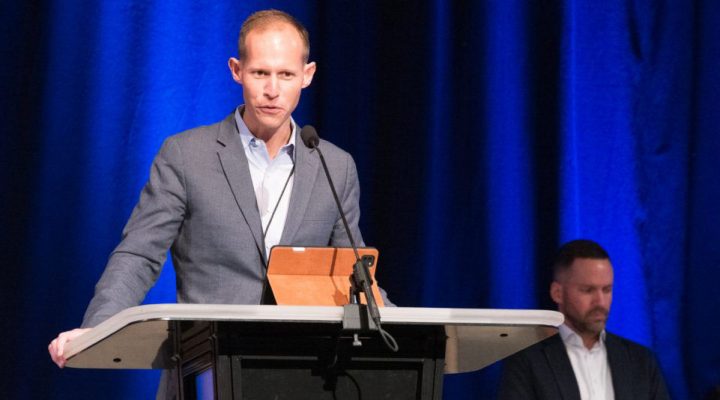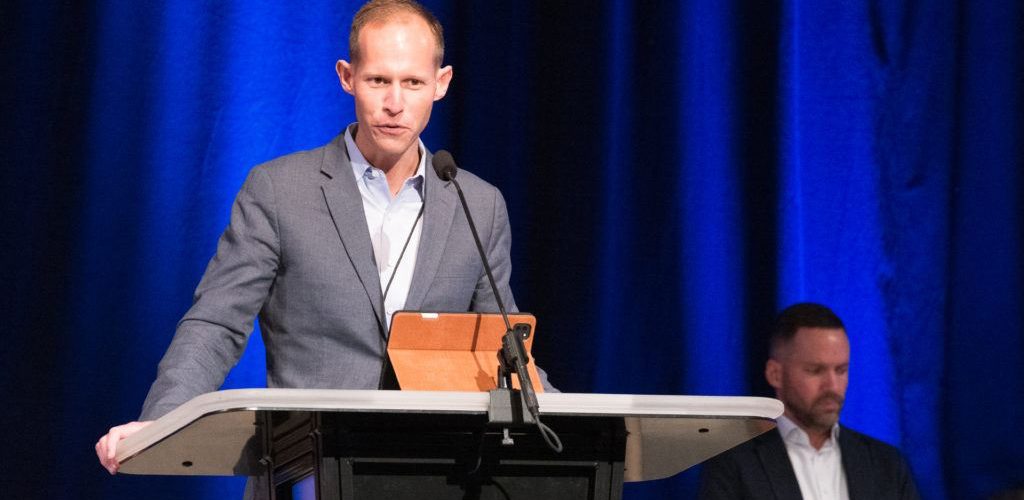A group tasked with studying ways to increase cooperation among a fractious Southern Baptist Convention has proposed four recommendations to be considered over the next year.
In addition to the four recommendations, the Cooperation Group said May 1 it believes the current language of the SBC Constitution regarding membership is clear and does not need to be changed.
The Constitution currently reads: “A church will only be deemed to be in friendly cooperation which has a faith and practice which closely identifies with the convention’s adopted statement of faith.”
That definition “is sufficient, together with any additional standards messengers have or may set forth in Article III, in setting the doctrinal parameters for the seating of messengers,” the report says. “The phrase ‘closely identifies with’ recognizes the freedom of the messenger body to interpret its statement of faith and to apply doctrinal standards to the seating of messengers, as they so choose in accordance with the governing documents.”
Section III of the Constitution, as quoted above, also includes this parenthetical: “By way of example, churches which act to affirm, approve or endorse homosexual behavior would be deemed not to be in cooperation with the convention.”
And if the Law Amendment passes this summer on second reading, it would add another part to Section III: “Does not affirm, appoint or employ a woman as a pastor of any kind.”
Baptist Faith and Message
As for defining the “faith and practice” cooperating churches must adhere to, a fuller description is given in the Baptist Faith and Message, the SBC’s doctrinal statement.
How that faith statement gets amended is one of the four recommendations from the Cooperation Group: “To ensure that edits or amendments to the Baptist Faith and Message follow the same process as amendments to the Constitution (two-thirds vote, two consecutive years), we recommend the Executive Committee propose changes to our governing documents for the convention’s consideration at the 2025 annual meeting.”
Historically, the SBC has appointed special committees to develop revisions as happened in 1963 and 2000. But last summer, a messenger to the annual meeting managed to amend the faith statement with a simple vote from the convention floor.
That successful amendment to Article VI concerns a definition of the role of pastor. The original wording called the “scriptural officers” of the church “pastors and deacons.” The revision says the church’s “two scriptural offices are that of pastor/elder/overseer and deacon.” The amendment further clarifies that “the office of pastor/elder/overseer is limited to men as qualified by Scripture.”
Removing churches
Another recommendation concerns how churches are removed from “friendly cooperation” with the SBC. And here the study group has a request for word choice: Stop using the term “disfellowship.”
“As a point of clarification about Southern Baptist polity and cooperation, we encourage Southern Baptists to refrain from the language of ‘disfellowshipping’ for churches that messengers determine no longer to be in friendly cooperation with the convention. Instead, we suggest the constitutional language, ‘not in friendly cooperation.’”
The word “disfellowship,” the group argues, “suggests the withdrawal of the hand of fellowship, implying such churches have ceased to be Christian churches, which may not always be the case.”
As for the way churches should be expelled, the Cooperation Group says the “sole authority” for that action rests with the convention in annual session, not with the SBC Executive Committee. Currently, churches may be removed from fellowship by vote of the Executive Committee, and that decision may be challenged on the convention floor.
“We believe it is best for messengers to have the sole authority to seat messengers, aided by the work of the Credentials Committee, in collaboration with the Executive Committee as needed,” the report says. “The Credentials Committee may consider recent votes of the convention when forming an opinion regarding the seating of messengers.”
Fidelity of trustees
A third recommendation concerns ensuring “the fidelity of our trustees to our doctrinal confession.” It asks the Executive Committee to propose changes to the SBC’s governing documents that would require the Committee on Nominations to nominate as entity trustees and standing committee members only those who affirm the Baptist Faith and Message.
The report does not explain what problem this recommendation seeks to solve, although the implication is that some current entity trustees and committee members may not agree fully with the Baptist Faith and Message.
Public list of churches
The SBC has appeared in a bad light several times lately when it has acted to expel churches that had not considered themselves affiliated with the convention in years. That could be avoided if the SBC Executive Committee reviewed the list of its churches, the study group said.
“If the Executive Committee makes available a public list of churches, Southern Baptists would benefit from greater accuracy and transparency in order to gain a clearer picture of which churches are cooperating through the convention,” the report says. “This list could include churches that seated messengers at the annual convention, completed an Annual Church Profile, and/or gave through the Cooperative Program.”
Cooperation Group Chairman Jared Wellman said the group’s work may undergo further editing and updates.
Other members of the group are SBC President Bart Barber, Kason Branch, Victor Chayasirisobhon, Jerome Coleman, Don Currence, Tara Dew, Nathan Finn, Donna Gaines, Matt Henslee, Travis Kerns, Richard Land, Jonathan Leeman, Jason Paredes, Greg Perkins, Jim Richards, Juan Sanchez, Andrew Walker, Trevin Wax and Tony Wolfe.


